Routine
disclaimer: After viewing 225 or
so 2003 releases, I felt I had a pretty good handle on the year in film. Then I
considered all of the movies screened in festivals that I missed,
those that left theaters before I had a chance to catch them, and those that
premiered directly on television or DVD... It's obvious that no such list is
definitive, but I still feel compelled to make that clear. The
criteria used in determining eligibility was a U.S. theatrical premiere
in 2003. Without further ado...
The Top Ten Films of 2003
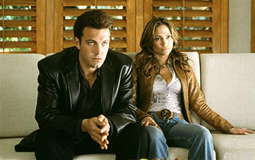 10. Gigli -
After the critical demolition it's received, I hate including Gigli at
the bottom at my year's top ten list. After all, the number ten spot is
traditionally reserved for guilty pleasures and films that the listmaker feels
he needs to make a special case for. I don't really feel either of those
criteria apply with Gigli. It's one of the most probing comedies in
recent memory, a progressive step forward for mainstream American film's
attitudes about gender roles, and a truly touching deconstruction of masculine
aggression. Perhaps more than any other movie this year, enjoyment of Gigli required
the viewer to forget the hype. If you're willing to remove the word "Bennifer"
from your vocabulary before you view it, you might be pleasantly surprised.
10. Gigli -
After the critical demolition it's received, I hate including Gigli at
the bottom at my year's top ten list. After all, the number ten spot is
traditionally reserved for guilty pleasures and films that the listmaker feels
he needs to make a special case for. I don't really feel either of those
criteria apply with Gigli. It's one of the most probing comedies in
recent memory, a progressive step forward for mainstream American film's
attitudes about gender roles, and a truly touching deconstruction of masculine
aggression. Perhaps more than any other movie this year, enjoyment of Gigli required
the viewer to forget the hype. If you're willing to remove the word "Bennifer"
from your vocabulary before you view it, you might be pleasantly surprised.
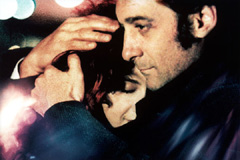 9. Friday Night -
When critics began falling over themselves to praise the mediocre mood piece Lost
in Translation this fall, I momentarily wondered if somehow the rest of the
world forgot about Claire Denis' doubly impressive Friday Night. Twice as
insular yet twice as warm as Coppola's feature-length posturing session, Denis'
film mines genuine suspense from its serendipitous intimate encounter. Like Translation,
Friday Night creates an astringent atmosphere where the creation of its
characters' bond becomes an attempt to reclaim human connection for themselves.
Denis doesn't need to douse her protagonists in cynicism to do that, however,
and as a result, she creates an intensely subjective experience that is capable
of appealing to more than the most cynical of moviegoers.
9. Friday Night -
When critics began falling over themselves to praise the mediocre mood piece Lost
in Translation this fall, I momentarily wondered if somehow the rest of the
world forgot about Claire Denis' doubly impressive Friday Night. Twice as
insular yet twice as warm as Coppola's feature-length posturing session, Denis'
film mines genuine suspense from its serendipitous intimate encounter. Like Translation,
Friday Night creates an astringent atmosphere where the creation of its
characters' bond becomes an attempt to reclaim human connection for themselves.
Denis doesn't need to douse her protagonists in cynicism to do that, however,
and as a result, she creates an intensely subjective experience that is capable
of appealing to more than the most cynical of moviegoers.
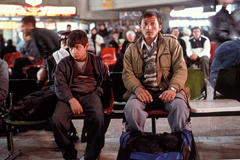 8. In This World -
If you've already glanced below, you might have noticed that I declared Michael
Winterbottom's In This World the best documentary of the year. Though the
story that this remarkable humanist statement tells is technically fictional, it
is so grounded in truth, and filmed in a style so naturalistic, that it becomes
as potent a call to address real-world problems as any non-fiction film.
Besides, in a year when documentaries are largely being praised for their
ability to resemble fictional works, why not acknowledge the rare film that
could pass for (and often is) recorded reality? Throughout In This World,
which chronicles the epic journey two Pakistani immigrants endure as they
illegally immigrate to London, Winterbottom deftly avoids melodrama and
consistently reminds the audience of the larger picture that his two lead
characters represent. His approach radiates respect for his subjects and strives
for human connection at a time when so many intelligent movies look at the world
and find only reasons to be alienated.
8. In This World -
If you've already glanced below, you might have noticed that I declared Michael
Winterbottom's In This World the best documentary of the year. Though the
story that this remarkable humanist statement tells is technically fictional, it
is so grounded in truth, and filmed in a style so naturalistic, that it becomes
as potent a call to address real-world problems as any non-fiction film.
Besides, in a year when documentaries are largely being praised for their
ability to resemble fictional works, why not acknowledge the rare film that
could pass for (and often is) recorded reality? Throughout In This World,
which chronicles the epic journey two Pakistani immigrants endure as they
illegally immigrate to London, Winterbottom deftly avoids melodrama and
consistently reminds the audience of the larger picture that his two lead
characters represent. His approach radiates respect for his subjects and strives
for human connection at a time when so many intelligent movies look at the world
and find only reasons to be alienated.
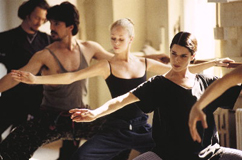 7. The Company -
Robert Altman's best work in a decade, The Company, is so effortless an
expression of its director's style and worldview that it's easy to take it for
granted. One of the greatest ballet movies ever made, it distinguishes itself
from the genre by gently eschewing the backstage drama’s central cliché. It
never becomes the story of a prima donna’s rise to fame. Star and producer
Neve Campbell holds her own among a cast comprised partially of professional
dancers, but, almost amazingly, does little more than that. She's given a
graceful, nearly wordless, romantic subplot, but even that is carefully
interwoven into a fugue of the company's artistic, financial, and practical
concerns. It’s difficult not to read a film that so strongly stresses the
amount of effort that goes into the presentation of the seemingly effortless as
a summation of Altman’s body of work, especially when the collection of an
ensemble of talent seems so key to making the magic happen. It's not hyperbole
to state that The Company does the master's remarkable oeuvre, and unique
method of filmmaking, justice.
7. The Company -
Robert Altman's best work in a decade, The Company, is so effortless an
expression of its director's style and worldview that it's easy to take it for
granted. One of the greatest ballet movies ever made, it distinguishes itself
from the genre by gently eschewing the backstage drama’s central cliché. It
never becomes the story of a prima donna’s rise to fame. Star and producer
Neve Campbell holds her own among a cast comprised partially of professional
dancers, but, almost amazingly, does little more than that. She's given a
graceful, nearly wordless, romantic subplot, but even that is carefully
interwoven into a fugue of the company's artistic, financial, and practical
concerns. It’s difficult not to read a film that so strongly stresses the
amount of effort that goes into the presentation of the seemingly effortless as
a summation of Altman’s body of work, especially when the collection of an
ensemble of talent seems so key to making the magic happen. It's not hyperbole
to state that The Company does the master's remarkable oeuvre, and unique
method of filmmaking, justice.
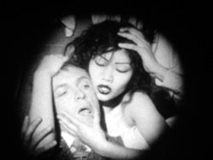 6. Cowards Bend the Knee -
Unfortunately only on this list due to a scant commercial run in Chicago, this
near-masterpiece courtesy of Canadian Guy Maddin has yet to achieve widespread
distribution. Its brief, 60-odd minute run time might be a stumbling block, as
might the fact that it's a silent film (initially conceived as a gallery
installation), but to these eyes it is as approachable and profound as anything
Maddin has made since Careful. Side-splittingly funny at times, this
Freudian tale of hockey players, amnesia, incest, and abortion also seems to be
the most personal work yet from the retro-master. Though the tide seems to
slowly be changing, it seems as if it's time for film culture to move Maddin
beyond cult status and acknowledge the worth of his idiosyncratic voice and
respect for cinematic history.
6. Cowards Bend the Knee -
Unfortunately only on this list due to a scant commercial run in Chicago, this
near-masterpiece courtesy of Canadian Guy Maddin has yet to achieve widespread
distribution. Its brief, 60-odd minute run time might be a stumbling block, as
might the fact that it's a silent film (initially conceived as a gallery
installation), but to these eyes it is as approachable and profound as anything
Maddin has made since Careful. Side-splittingly funny at times, this
Freudian tale of hockey players, amnesia, incest, and abortion also seems to be
the most personal work yet from the retro-master. Though the tide seems to
slowly be changing, it seems as if it's time for film culture to move Maddin
beyond cult status and acknowledge the worth of his idiosyncratic voice and
respect for cinematic history.
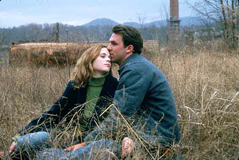 5. All the Real Girls -
David Gordon Green's second feature managed to capture a feeling so precious and
sensitive that I found myself loathe to write about the movie, lest I demystify
the feelings I felt while watching it. Rare is the love story that manages
to capture the feelings of elation and infatuation that come with the act of
falling in love as successfully as this one, and while it teeters on the edge of
preciousness from time to time, the remarkable work of Zooey Deschanel and Paul
Schneider ensures that the screenplay's dreams emanate from recognizable
dreamers. What links Girls with George Washington, Green's
similarly high-caliber debut feature, is the way it suffuses its wide-eyed
romanticism so thoroughly into its scenes of distinctive local color. A slightly more mature outlook distinguishes the
latter film, however. Everything in All the Real Girls aches with
possibility, which makes the threat of change, and upset to idyllic love, a
palpable force.
5. All the Real Girls -
David Gordon Green's second feature managed to capture a feeling so precious and
sensitive that I found myself loathe to write about the movie, lest I demystify
the feelings I felt while watching it. Rare is the love story that manages
to capture the feelings of elation and infatuation that come with the act of
falling in love as successfully as this one, and while it teeters on the edge of
preciousness from time to time, the remarkable work of Zooey Deschanel and Paul
Schneider ensures that the screenplay's dreams emanate from recognizable
dreamers. What links Girls with George Washington, Green's
similarly high-caliber debut feature, is the way it suffuses its wide-eyed
romanticism so thoroughly into its scenes of distinctive local color. A slightly more mature outlook distinguishes the
latter film, however. Everything in All the Real Girls aches with
possibility, which makes the threat of change, and upset to idyllic love, a
palpable force.
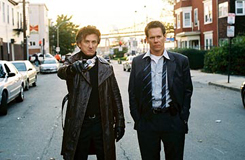 4. Mystic River -
Clint Eastwood's grand statement about community standards shocks mostly because
it reveals the truism that even the most seemingly typical and homogenous of
communities don't share a common moral standard. After viewing Mystic River,
I found myself shaken, utterly unable to take comfort in its resolution, which
means it's either one of the most effective muckraking Hollywood potboilers I've
seen or something grander that approaches a truly democratic tragedy. Eastwood
harnesses the year's best ensemble of actors to create an atmosphere where the
audience is incessantly reminded of the toll that the drama is taking on the
lives of those involved, and at the same time manages to make it larger than
them. It's a film that pulled me in, shook me around, left me dazed, and somehow
regretting that I couldn't go through all that more often.
4. Mystic River -
Clint Eastwood's grand statement about community standards shocks mostly because
it reveals the truism that even the most seemingly typical and homogenous of
communities don't share a common moral standard. After viewing Mystic River,
I found myself shaken, utterly unable to take comfort in its resolution, which
means it's either one of the most effective muckraking Hollywood potboilers I've
seen or something grander that approaches a truly democratic tragedy. Eastwood
harnesses the year's best ensemble of actors to create an atmosphere where the
audience is incessantly reminded of the toll that the drama is taking on the
lives of those involved, and at the same time manages to make it larger than
them. It's a film that pulled me in, shook me around, left me dazed, and somehow
regretting that I couldn't go through all that more often.
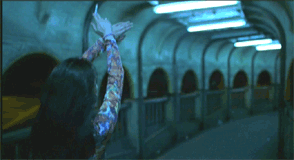 3. Millennium Mambo -
Hypnotic in the extreme, Millennium Mambo appears to be Taiwanese
director Hou's master-shot style come to fruition and turned up a few notches.
Like several of his films, it is a potent commentary on the toll of social
change on the people in that society. Here he sets his sights on a more intimate
scale than usual, opting to focus on the gradual maturation of a young girl.
What ensues is a series of cyclic episodes that reveal the traps of a hedonistic
culture that essentially robs youth of a childhood by expecting them to function
prematurely as adults. Appropriately, the backdrop of this fast-paced lifestyle
is chock full of flashy diversions, among which one could count Mark Li
Ping-bin's mesmerizing cinematography and Lim Giong's superb techno soundtrack.
The more the technical aspects of this movie pull you in, the more assertive
Hou's message becomes. The director might have left behind the opium dens of his
Flowers of Shanghai, but he has no trouble finding similar forms of
anesthesia in a modern milieu.
3. Millennium Mambo -
Hypnotic in the extreme, Millennium Mambo appears to be Taiwanese
director Hou's master-shot style come to fruition and turned up a few notches.
Like several of his films, it is a potent commentary on the toll of social
change on the people in that society. Here he sets his sights on a more intimate
scale than usual, opting to focus on the gradual maturation of a young girl.
What ensues is a series of cyclic episodes that reveal the traps of a hedonistic
culture that essentially robs youth of a childhood by expecting them to function
prematurely as adults. Appropriately, the backdrop of this fast-paced lifestyle
is chock full of flashy diversions, among which one could count Mark Li
Ping-bin's mesmerizing cinematography and Lim Giong's superb techno soundtrack.
The more the technical aspects of this movie pull you in, the more assertive
Hou's message becomes. The director might have left behind the opium dens of his
Flowers of Shanghai, but he has no trouble finding similar forms of
anesthesia in a modern milieu.
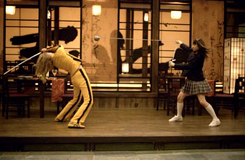 2. Kill Bill: Volume 1 -
The natural reaction to the prospect of this new Tarantino movie seemed to be
skepticism. After all, who could think of a fanboy-targeted romp through genre
cinema as a progression for the director after the relatively staid move toward
maturity he made with Jackie Brown? After seeing the first half of Kill
Bill twice, I'm still not sure that I think of it as progression, per se,
but I'm more convinced than ever that Tarantino can more than deliver in just
about any genre he tries his hand in. It's impossible to watch and not be aware
that what we're seeing is a pastiche, but that's partially because Kill Bill is
throwing more at us than we could possibly expect to see from one creative team.
The end result is so captivating and remarkably cohesive that the director
easily skirts any accusations that he's a pilferer. Everywhere, in between the
clever lines of dialogue and in the way he chooses to hold his shots, Tarantino
seems to be revealing himself. Now, I'm a believer. Kill Bill: Volume 2's
upcoming release has me expecting a masterpiece. Tarantino has set a
ridiculously high standard for himself here, but if there's anyone capable of
pulling it off...
2. Kill Bill: Volume 1 -
The natural reaction to the prospect of this new Tarantino movie seemed to be
skepticism. After all, who could think of a fanboy-targeted romp through genre
cinema as a progression for the director after the relatively staid move toward
maturity he made with Jackie Brown? After seeing the first half of Kill
Bill twice, I'm still not sure that I think of it as progression, per se,
but I'm more convinced than ever that Tarantino can more than deliver in just
about any genre he tries his hand in. It's impossible to watch and not be aware
that what we're seeing is a pastiche, but that's partially because Kill Bill is
throwing more at us than we could possibly expect to see from one creative team.
The end result is so captivating and remarkably cohesive that the director
easily skirts any accusations that he's a pilferer. Everywhere, in between the
clever lines of dialogue and in the way he chooses to hold his shots, Tarantino
seems to be revealing himself. Now, I'm a believer. Kill Bill: Volume 2's
upcoming release has me expecting a masterpiece. Tarantino has set a
ridiculously high standard for himself here, but if there's anyone capable of
pulling it off...
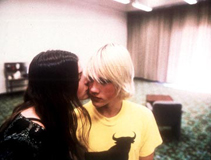 1. Elephant -
Gus Van Sant's second attempt, after Gerry, to apply the lessons he's
learned from watching Bela Tarr films produces much greater returns with this
searing, searching drama about high school violence. With a roaming Steadicam, a
criss-crossing time structure, and a seemingly endless sense of curiosity, Van
Sant's Elephant creates a world that suggests myriad possibilities before
plunging it into tragedy. It's tempting to call what the film presents an elegy,
but it's far too interested in life, in examining it and debunking an easy assessment
of it, to be accused of fixating on death. When the camera tracks after a
character in Elephant, they suddenly cease to be a stereotype, but in
this film's oppressive environment, where people are encouraged to define
themselves, there exists a contradictory impulse (perhaps a defense mechanism?)
to pigeonhole all others. Time and again, with astute observation, the jock that
walks by or the geek in the corner becomes someone more. The seeming omnipotence
that Elephant gives the audience is revealed to be a series of
constrained perspectives, and in that constraint of perspective, Van Sant
provides his greatest observations on our real life tragedies and high school
realities. The film suggests that in order for high school to empower those who
attend, so that they might find their individuality, it needs to cut them off
from the realities of the world and deliberately constrain their understanding.
Suddenly, in this microcosm, small social snubs matter more, and the prospect of
consequences for negative actions seems more remote. Real world repercussions
and motives are a non-issue to those this mindset, because they aren't
functioning in the real world. Everything about Elephant's style begs us
to assume the mindset of the people that its eventual tragedy is engineered by
and targeted at. It's only by doing that that true understanding can begin.
1. Elephant -
Gus Van Sant's second attempt, after Gerry, to apply the lessons he's
learned from watching Bela Tarr films produces much greater returns with this
searing, searching drama about high school violence. With a roaming Steadicam, a
criss-crossing time structure, and a seemingly endless sense of curiosity, Van
Sant's Elephant creates a world that suggests myriad possibilities before
plunging it into tragedy. It's tempting to call what the film presents an elegy,
but it's far too interested in life, in examining it and debunking an easy assessment
of it, to be accused of fixating on death. When the camera tracks after a
character in Elephant, they suddenly cease to be a stereotype, but in
this film's oppressive environment, where people are encouraged to define
themselves, there exists a contradictory impulse (perhaps a defense mechanism?)
to pigeonhole all others. Time and again, with astute observation, the jock that
walks by or the geek in the corner becomes someone more. The seeming omnipotence
that Elephant gives the audience is revealed to be a series of
constrained perspectives, and in that constraint of perspective, Van Sant
provides his greatest observations on our real life tragedies and high school
realities. The film suggests that in order for high school to empower those who
attend, so that they might find their individuality, it needs to cut them off
from the realities of the world and deliberately constrain their understanding.
Suddenly, in this microcosm, small social snubs matter more, and the prospect of
consequences for negative actions seems more remote. Real world repercussions
and motives are a non-issue to those this mindset, because they aren't
functioning in the real world. Everything about Elephant's style begs us
to assume the mindset of the people that its eventual tragedy is engineered by
and targeted at. It's only by doing that that true understanding can begin.
The Next Ten:
Cold Mountain, Something's Gotta
Give, Charlie's Angel's: Full Throttle,
Raising Victor Vargas, The Human
Stain,
The Texas Chainsaw Massacre, Looney Tunes: Back in Action, The Good
Thief, Down
With Love, Girl With a Pearl Earring
Achievements
in Individual Categories:
Best
Director - Gus Van Sant, Elephant (Runner-up: Quentin Tarantino, Kill
Bill: Volume 1)
Best
First Feature - Raising Victor Vargas (Runner-up: The Texas
Chainsaw Massacre)
Best Ensemble - Mystic
River (Runner-up: Cold Mountain)
Best Actress - Zooey
Deschanel, All the Real Girls (Runner-up: Shu Qi, Millennium Mambo)
Best Actor - Sean Penn, Mystic
River (Runner-up: Nick Nolte, The Good Thief)
Best Supporting Actor -
Peter Sarsgaard, Shattered Glass (Runner-up: David Hyde Pierce, Down
With Love)
Best Supporting Actress -
Renee Zellweger, Cold Mountain (Runner-up: Holly Hunter, Thirteen)
Best Original Screenplay -
Martin Brest, Gigli (Runner-up: David Gordon Green & Paul Schneider, All
the Real Girls)
Best Adapted Screenplay -
Nicholas Meyer, The Human Stain (Runner-up: Brian Helgeland, Mystic
River)
Best Editing - Peter
Christelis, In This World (Runner-up: Sally Menke, Kill Bill, Volume 1)
Best Cinematography - Mark
Li Ping-bin, Millennium Mambo (Runner-up: Harris Savides, Elephant)
Best Art Direction -
Martin Whist & Andrew Laws, Down With Love (Runner-up: David F.
Klassen & J. Michael Riva, Charlie's Angels: Full Throttle)
Best Costumes - Kumiko
Ogawa & Catherine Marie Thomas, Kill Bill, Volume 1 (Runner-up:
Joseph G. Aulisi, Charlie's Angels: Full Throttle)
Best Sound - Tu Du-Che, Millennium
Mambo (Runner-up: Scott Sanders, Open Range)
Best Sound Editing - David
A. Cohen, Elephant (Runner-up: Wylie Stateman, Kill Bill, Volume 1)
Best Visual Effects -
Rodolphe Chabrier, Irreversible (Runner-up: Misako Saka, Ichi the
Killer)
Best Makeup - Yuuichi
Matui, Ichi the Killer (Runner-up: Lee Grimes, Monster)
Best Original Score - Lim
Giong, Millennium Mambo (Runner-up: Hans Zimmer, The Last Samurai)
Best Original Song - A
Pure Person by Lim Giong, Millennium Mambo
Best Documentary - In
This World (Runner-up: Winged
Migration)
Best Animated Film - Looney Tunes: Back
in Action
Ten Best Foreign Films - Millennium
Mambo, In This World, Friday Night, Japon, Together,
demonlover, Winged Migration, Ichi the Killer, Irreversible,
Platform
Ten Best '02/'03 Films Still
Without U.S. Distribution - Alila, Who Killed Bambi?, The
Virgin of Lust, Happy Here and Now, Raja, A Heart Elsewhere,
Goodbye, Dragon Inn, L'Historie
de Marie et Julien, The Brown Bunny, La
Vie Nouvelle
Ten Best Films With
Distributors, Still Awaiting Release - Dogville (Lion's Gate), Twentynine
Palms (Wellspring), Hero (Miramax), Code 46 (United Artists), Springtime
in a Small Town (Palm Pictures), Time of the Wolf (Palm Pictures), Zatoichi
(Miramax), This So-Called Disaster (IFC Films), The Trilogy
(Magnolia), Distant (New Yorker)
12-29-03
Jeremy Heilman